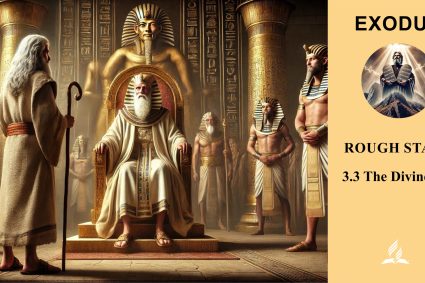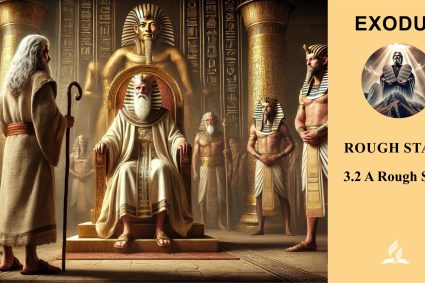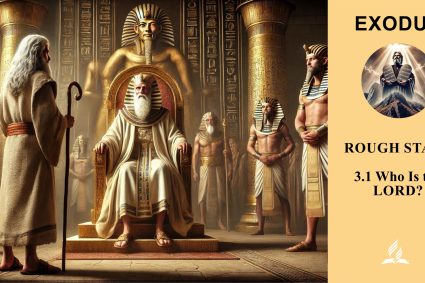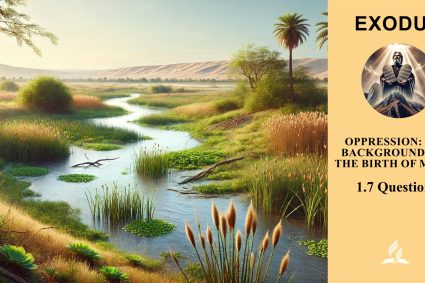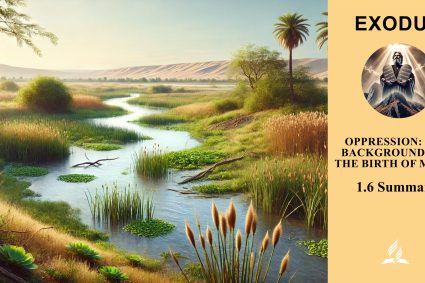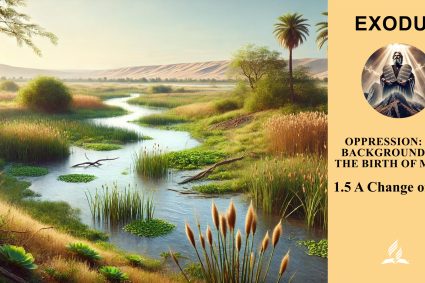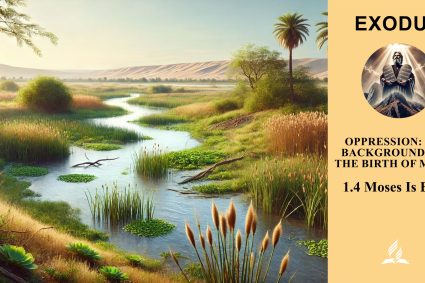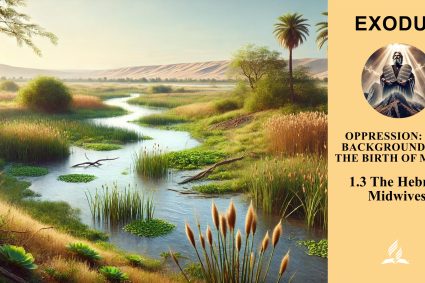

4.4 Defender and Deliverer
Read 1 Corinthians 10:1–4. How does Paul describe the Israelites’ exodus from Egypt? What spiritual lesson is he trying to convey?
In 1 Corinthians 10:1–4, Paul writes about the Israelites’ exodus from Egypt and uses it as a spiritual lesson for the Corinthian church.
Paul symbolically describes the events of the Israelites’ exodus:
-
Under the cloud: Refers to the pillar of cloud that led the Israelites during their Exodus—an evident sign of God’s presence.
-
Passed through the sea: Reminds of the miracle where God parted the Red Sea, allowing the Israelites to escape their Egyptian pursuers.
-
Baptized into Moses: Symbolic baptism in the cloud and sea during their passage, signifying identification with Moses as their leader.
-
Same spiritual food and drink: Refers to the provision of manna (spiritual food) and water from the rock (spiritual drink) during their journey.
-
The Rock was Christ: Paul indicates that the rock providing water was a representation of Christ, the source of spiritual refreshment.
The spiritual lesson Paul intends to convey is that the Israelites experienced spiritual realities in these events that pointed to Christ. Through their experiences, they were guided by God, baptized, and provided with spiritual nourishment and drink. Paul uses this to exhort the Corinthian church to remain faithful to God, resist temptation, and beware of idolatry, drawing attention to the consequences the Israelites faced when they deviated from God.
Read Psalm 114. How is the divine liberation of the people of Israel from Egypt described poetically?
The poetic description in Psalm 114 vividly portrays the divine liberation of the people of Israel from Egypt. Here is a summary:
-
Nature Obeys God:
-
The psalm begins by noting that the sea and the Jordan River responded to Israel’s exodus by fleeing and turning back, respectively. These are marvelous depictions of natural forces obeying God as He led His people.
-
-
Mountains and Hills as Witnesses:
-
The psalm describes the mountains and hills as lively witnesses to God’s power. They reacted to God’s presence as if alive, acknowledging the Creator’s sovereignty.
-
-
Earth Trembles Before the Lord:
-
The trembling of the earth signifies the awe and recognition of the entire creation in the face of the Almighty. It poetically suggests that the earth itself quakes in reverence.
-
-
Call to Awe and Worship:
-
The psalm concludes with a call for the earth to tremble before the Lord, acknowledging the God of Jacob. It encourages worshipful awe and reverence for the Creator.
-
The poetic depiction in Psalm 114 emphasizes God’s power and sovereignty over nature, with the entire creation responding to His presence. This psalm encourages recognizing God’s greatness and trembling in awe before Him. These themes align with the New Testament teachings, especially concerning liberation through Jesus Christ and the salvation of believers.
What are some of the spiritual dangers that we, as believers, are exposed to? How can we learn to rely on the power of God to guard us against these dangers, which are just as real for us today as they were for the psalmist?
As believers, we can face various spiritual dangers. Here are some of them and approaches on how we can learn to rely on God’s power to guard against these dangers, which are as real for us today as they were for the psalmist:
-
Temptations and Sins:
-
Danger: The temptation to engage in sinful paths is prevalent.
-
God’s Power: Relying on God’s Word to equip us against temptations (Psalm 119:11), along with consistent prayer, Bible study, and fellowship with other believers, strengthens us.
-
-
Doubt and Unbelief:
-
Danger: Doubting God’s existence, love, or power can impact our spiritual journey.
-
God’s Power: Holding onto God’s promises in the Bible, hearing the testimonies of other believers, and recalling past experiences of encountering God help strengthen our faith against doubt.
-
-
Pride and Self-Righteousness:
-
Danger: Pride can lead us to rely on our own abilities and distance ourselves from God.
-
God’s Power: Cultivating humility before God and acknowledging our dependence on Him are crucial. Praying for wisdom and being willing to follow God’s guidance help overcome pride.
-
-
Worldly Distractions:
-
Danger: The world offers many distractions that can divert us from our relationship with God.
-
God’s Power: Making a conscious decision to distance ourselves from worldly distractions and striving for a balanced lifestyle based on Christian principles help prevent succumbing to the world.
-
-
Spiritual Apathy:
-
Danger: Negligence in faith and spiritual apathy can lead to neglecting our relationship with God.
-
God’s Power: Regular spiritual disciplines such as prayer, Bible study, worship, and fellowship help maintain the flame of faith. Seeking God’s presence actively prevents spiritual apathy.
-
-
Divided Community:
-
Danger: Conflicts and divisions in the community of believers can pose spiritual dangers.
-
God’s Power: Applying Christian principles like love, forgiveness, and unity, coupled with prayer for the community, can help overcome these dangers.
-
-
Self-Righteous Religiosity:
-
Danger: Relying on external religiosity without a personal relationship with God.
-
God’s Power: Emphasizing a vibrant relationship with God characterized by love and devotion, over external rituals, helps counter self-righteous religiosity.
-
It’s important to realize that our strength is limited, but God’s power is boundless. Through prayer, Bible study, community, and humility, we can rely on God’s power to guard us against spiritual dangers.
(Visited 16 times, 1 visits today)

